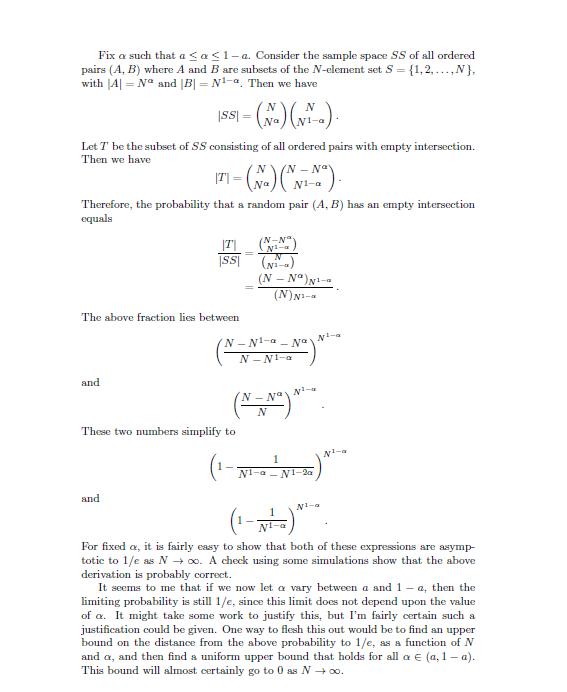 Author
Author |
Topic: Disjoint Sets (Read 3949 times) |
|
Barukh
Uberpuzzler
    

Gender: 
Posts: 2276
|
 |
Disjoint Sets
« on: Dec 22nd, 2013, 12:19am » |
 Quote Quote  Modify Modify
|
Consider a set of N different values.
By randomly choosing elements from N, two subsets – A and B – are formed, so that |A|*|B| = N, and |A|, |B| > Na for some constant a (e.g. their sizes depend on N).
What is the probability that A and B are disjoint, when N is big?
|
|
 IP Logged IP Logged |
|
|
|
Michael Dagg
Senior Riddler
   

Gender: 
Posts: 500
|
Comments...
|
|
 IP Logged IP Logged |

Regards,
Michael Dagg
|
|
|
Michael Dagg
Senior Riddler
   

Gender: 
Posts: 500
|
 |
Re: Disjoint Sets
« Reply #2 on: Dec 26th, 2013, 10:43am » |
 Quote Quote  Modify Modify
|
I've thought of another way to see that the limiting
probability of 1/e is reasonable. Choose a random set A of
legal size (i.e. of size N^\alpha, where a < \alpha < 1-a). Then begin
constructing B by choosing random elements from S. At each choice,
the probability of choosing a member of A is N^(\alpha - 1). If we keep
track of the number of choices X that are members of A, then X is
Poisson distributed with parameters n = N^(1-\alpha) and p = N^(\alpha - 1).
Therefore, the probability of choosing no member of A is e^(-np) = 1/e. The only
reason this isn't exact is that when constructing B, we might choose an
element more than once. One can show that the expected number of elements
of S that are chosen more than once is quite small, so this shouldn't affect
the limiting probability.
|
| « Last Edit: Dec 26th, 2013, 10:43am by Michael Dagg » |
 IP Logged IP Logged |
Regards,
Michael Dagg
|
|
|
|
 WRITE MATH!
WRITE MATH!
 Home
Home  Help
Help  Search
Search  Members
Members  Login
Login  Register
Register WRITE MATH!
WRITE MATH!
 Home
Home  Help
Help  Search
Search  Members
Members  Login
Login  Register
Register